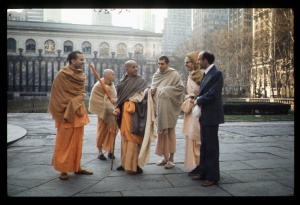SB 1.19.30

A.C. Bhaktivedanta Swami Prabhupada
TEXT 30
- sa saṁvṛtas tatra mahān mahīyasāṁ
- brahmarṣi-rājarṣi-devarṣi-saṅghaiḥ
- vyarocatālaṁ bhagavān yathendur
- graharkṣa-tārā-nikaraiḥ parītaḥ
SYNONYMS
saḥ — Śrī Śukadeva Gosvāmī; saṁvṛtaḥ — surrounded by; tatra — there; mahān — great; mahīyasām — of the greatest; brahmarṣi — saint among the brāhmaṇas; rājarṣi — saint among the kings; devarṣi — saint among the demigods; saṅghaiḥ — by the assembly of; vyarocata — well deserved; alam — able; bhagavān — powerful; yathā — as; induḥ — the moon; graha — planets; ṛkṣa — heavenly bodies; tārā — stars; nikaraiḥ — by the assembly of; parītaḥ — surrounded by.
TRANSLATION
Śukadeva Gosvāmī was then surrounded by saintly sages and demigods just as the moon is surrounded by stars, planets and other heavenly bodies. His presence was gorgeous, and he was respected by all.
PURPORT
In the great assembly of saintly personalities, there was Vyāsadeva the brahmarṣi, Nārada the devarṣi, Paraśurāma the great ruler of the kṣatriya kings, etc. Some of them were powerful incarnations of the Lord. Śukadeva Gosvāmī was not known as brahmarṣi, rājarṣi or devarṣi, nor was he an incarnation like Nārada, Vyāsa or Paraśurāma. And yet he excelled them in respects paid. This means that the devotee of the Lord is more honored in the world than the Lord Himself. One should therefore never minimize the importance of a devotee like Śukadeva Gosvāmī.